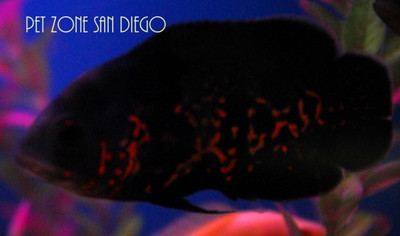The Oscar Cichlid
Posted by Max Gandara on on 19th Sep 2023
The Oscar Cichlid, scientifically known as Astronotus ocellatus, is a
captivating and popular freshwater fish that has captured the hearts of
aquarium enthusiasts around the world. Known for its vibrant colors,
distinct patterns, and intriguing behaviors, the Oscar Cichlid has
become a beloved addition to many home aquariums. In this article, we
will delve into the fascinating world of the Oscar Cichlid, exploring
its natural habitat, physical characteristics, care requirements, and
the joy it brings to aquarists.
The Oscar Cichlid is native to the Amazon River basin in South America,
which includes countries such as Brazil, Colombia, and Peru. In the
wild, Oscars inhabit slow-moving rivers, lakes, and flooded forests.
These fish are often found in murky waters, which is why they have
developed unique adaptations to thrive in such environments.
1. Size: Oscars are known for their impressive size. They can grow up to
12 to 16 inches (30 to 40 cm) or even larger in captivity, making them
one of the larger cichlid species.
2. Coloration: One of the most striking features of Oscars is their
stunning coloration. They come in various color morphs, including red,
albino, tiger, and wild-type, each with its own distinct patterns and
shades. The classic wild-type Oscar boasts a base coloration of dark
gray or black with vibrant orange, red, or yellow spots and patterns.
3. Body Shape: Oscars have a robust and laterally compressed body with a
unique oval shape. Their dorsal fin and anal fin extend across their
body, giving them an almost disc-like appearance.
4. Eyespot: A distinguishing feature of the Oscar Cichlid is the black
eyespot on its dorsal fin, which is thought to serve as a defensive
mechanism, intimidating potential predators and rivals.
Oscar Cichlids are not the easiest fish to care for, but with proper
attention and dedication, they can thrive in captivity. Here are some
key care requirements for Oscars:
1. Tank Size: Due to their large size, Oscars need a spacious aquarium. A
tank of at least 75 gallons is recommended for a single adult Oscar,
and larger tanks are necessary for multiple Oscars or other tank mates.
2. Water Parameters: Oscars prefer slightly warm water with a
temperature range of 74-81°F (23-27°C). They are not very particular
about water pH, but it should ideally be in the range of 6.0 to 7.5.
3. Filtration: Oscars are messy eaters, so a robust filtration system is
essential to maintain water quality. Canister filters or large sump
systems are often recommended.
4. Diet: Oscars are omnivorous and have hearty appetites. They will eat a
variety of foods, including high-quality pellets, live or frozen foods
like earthworms, shrimp, and even some vegetable matter.
5. Tank Decor: Provide hiding places and structures like caves or PVC
pipes for Oscars to explore and establish territories. They enjoy
rearranging their environment, so be prepared for occasional
redecorating.
Oscar Cichlids are known for their intelligence and engaging behavior.
They are territorial and can be aggressive, especially during breeding
or if their territory is threatened. It's best to keep Oscars with other
fish of similar size and temperament. Common tank mates include other
South American cichlids like Severums or large catfish species.
Breeding Oscars in captivity can be a rewarding experience for
experienced aquarists. A pair will typically select a flat surface,
often a rock or piece of driftwood, to lay their eggs on. The parents
are dedicated guardians, caring for their eggs and fry, which is a
fascinating process to observe.
The Oscar Cichlid is a magnificent fish species that has earned its
place in the hearts of aquarium enthusiasts worldwide. With their
striking appearance, captivating behavior, and unique personalities,
Oscars make for a truly rewarding and enjoyable addition to any
freshwater aquarium. However, their care requirements and potential
aggression should not be taken lightly, so responsible ownership and
adequate research are essential for providing them with a happy and
healthy life in captivity.

